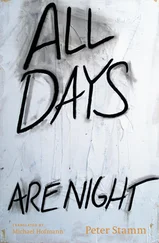She called the children. They came out of the water, and ran over to pick up their things. They dried off, and put their clothes on.
When they were smaller, Andreas had sometimes looked after them. He had taken them to the cinema, and watched kids’ films with them and enjoyed himself almost as much as they had. He had bought them ice cream and gone to the park with them, where they had run around and played. They had laughed and screamed they were having so much fun. Then, from one moment to the next, they had clammed up and said they wanted to go home. It was as though they were suddenly afraid of him. On the way home, they almost hadn’t let him take them by the hand, and when they got home, they had flung themselves at Marthe and buried their heads in her skirts, and Marthe had apologized and said she didn’t know what had got into them. What’s the matter with you, she had asked, but the children had stood there sullenly and not said anything. Andreas hadn’t minded. Perhaps he understood them better than Marthe, or Jean-Marc, who told them to snap out of it.
The older the children got, the more they learned to mask their feelings, to conceal their love, and their dislike and their fear. Now they greeted Andreas amiably when they saw him. They weren’t afraid of him anymore, but they had lost their trustingness. They told him about school and tried out their little bit of German on him. How do you do? And Andreas corrected them: How are you? I’m fine. Yes, I’m fine.
Michel, the younger, asked Andreas if he had seen the ships in Brest. Marthe said the big harbor festival was happening again.
“Weren’t you here four years ago?”
Andreas nodded, and Michel talked enthusiastically about the Sedov , a Russian training ship that they had visited a few days ago.
“It’s the biggest sailing ship in the world, a hundred and twenty meters long.”
“Michel wants to be a sailor now,” Marthe laughed.
“Yes, but only on a sailing ship,” said the boy.
“The ship comes from Murmansk. Do you know where that is? It’s way up in the north. And then it’s always at sea. There’s no mama there to look after you.”
When they returned to the house, they found Jean-Marc sitting at the kitchen table, reading the sports section of the paper. He had a headache, he said. Marthe said he had only himself to blame for that. The children disappeared upstairs. They must have felt the atmosphere was wrong. Marthe stood behind Jean-Marc, and laid her hands on his shoulders. He turned his head around and looked up at her with a doggish expression. The scene was pathetic and moving at the same time, a couple of drowning people clutching onto one another. Andreas said he would take the train at quarter to four. Marthe said why didn’t he stay a couple of days. He shook his head, and she said she would give him a ride to the station.
“I’ll do it,” said Jean-Marc.
The way back seemed to Andreas to take longer than the way there, even though Jean-Marc drove fast. The winding road followed the bay inland, and then crossed the river and doubled back along the coast. Jean-Marc didn’t speak for the entire drive, and Andreas closed his eyes, and dozed off. They got to Brest fully an hour before the train was due to leave.
“Do you want to stop for a drink?” Andreas asked, out of politeness.
They went to a café next to the station. Some of the tables were occupied by sailors in dark blue uniforms.
“They must be from the Sedov ,” said Jean-Marc. “That’s a Russian training ship. They’re here for the big harbor celebrations.”
“Michel was talking about it,” said Andreas.
They stood at the bar, drinking coffee. Jean-Marc appeared to want to say something. It took him a couple of run-ups before he could ask his question.
“Are you really together with her?”
“It’s nothing serious,” said Andreas.
He looked at Jean-Marc, but he had lowered his eyes, and seemed to be looking for words again. Finally he said he didn’t hold it against Andreas. He wasn’t to know …
“Know what?” asked Andreas.
“I don’t know what to do,” said Jean-Marc. “I can’t get over her. And I don’t even know what she thinks about me. Did you talk about me?”
“No,” lied Andreas.
“What was she like?”
Andreas said he didn’t know what Jean-Marc meant.
“What she was like in bed.”
Andreas said Delphine had moved in with him for a couple of days. He felt sorry for Jean-Marc. The way he was suffering, and didn’t even try to conceal it. There was something humiliating about a man of his age not having more self-control.
“I’m crazy about her,” said Jean-Marc. “Do you really think she’ll sleep with anyone?”
“That’s rubbish,” said Andreas. “She said you showed her pictures of your kids.”
“Oh, so you did talk about me. What did she say?”
“She said you were a moron.”
Jean-Marc’s head jerked up. He looked questioningly at Andreas, then he lowered his head, and said he’d better go. His voice sounded washed out, almost inaudible. See you soon, said Andreas. Jean-Marc raised his hand in greeting, and walked out. Andreas watched him cross the road, get in his car, and sit there for a moment, quite still, before driving off. Andreas asked himself how he had struck up this friendship with Jean-Marc, why he had spent so much time with him, when he was someone to whom he felt totally indifferent. He was back in Paris by eight o’clock. He didn’t feel well, and he took a taxi from the station. There were a couple of messages on the answering machine. The first was from Nadia. She said she forgave him, and then she went straight into a new round of reproaches. He wiped the message before he’d got to the end. The second was from the doctor’s office. A woman’s voice asked him to call back. It was a completely unemotional voice. Andreas deleted the second message as well.
He started tidying up his things. First, he stashed everything in cardboard boxes that he brought up from the basement. Then he started throwing away more and more. He had taken the books off the shelves and sorted them into two piles. He looked through them a second time, and pulled out a Jack London book and the book about the au pair girl. All the others went in the junk. He carried the full trash bags out into the corridor. It was eleven o’clock. He felt exhausted. He lay down on the bed without undressing or turning off the light.
In the middle of the night he was awakened by a fit of coughing. He got up to go to the bathroom. He felt cold. He turned on the central heating, slid under the blankets with his clothes on, and turned off the light. The stand-by lights glowed in the dark. One day, when there are no more people left in the world, he thought, there will still be stand-by lights glowing, and the clocks on electronic devices will continue to tell the time that no longer exists, until the last power plants have switched off and the last batteries are dry.
In the morning, he woke up late. It was hot in the bedroom, and the air felt dry. He had another fit of coughing that seemed to go on for ever. After he’d drunk his coffee, he felt a little better. He went back to tidying. The things he’d stowed in cardboard boxes the night before he now threw away.
At noon, he carted all the garbage bags down to the yard. He went to McDonald’s and bought something to eat. When he came back, there was a message on the answering machine. It was the realtor, to say he had found some potential buyers for the apartment, and that he would be there in fifteen minutes to show them around. No sooner had Andreas heard the end of the message than the bell rang, and the key turned in the lock.
He had thought Andreas was on vacation, the realtor said. Andreas said he had come home earlier than he’d expected. He was just clearing up in the apartment. They should have a look around, by all means. The realtor introduced him to the potential buyers, who were a couple from Perpignan by the name of Cordelier. The woman was pregnant, and looked rather teary. The man had black hair, a tanned face, and a brutal expression. He said he worked for a wholesale florist, and had been moved to Paris to give things there a bit of a shaking-up.
Читать дальше












